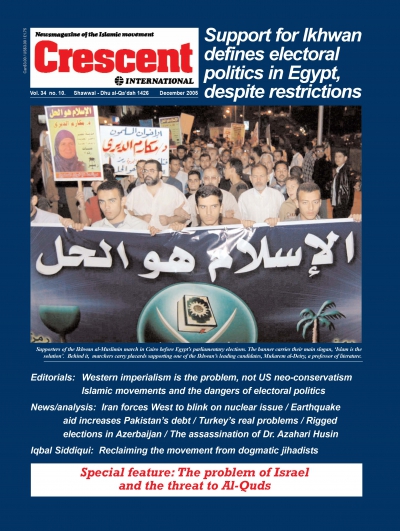Crescent International Vol. 34, No. 10
Newsmagazine of the Islamic movement
Iqbal Siddiqui
Shawwal, 1426 2005-12


The thrusts and counter-thrusts into each other's enclaves by Iraqi Sunnis and Iraqi Shi‘is – both reinforced by their unwitting and well-meaning supporters among Sunnis and Shi‘is outside of Iraq – and resulting in a growing number of innocent victims as sectarian violence threatens to become the basis for a protracted war between Sunnis and Shi‘is. Such a conflict would not be of their own planning, but is becoming almost inevitable as each side is drawn into deeper and deeper resentment, hatred and cruelty. This sectarian mindset that is taking root in Iraq is also liable to spread into surrounding countries, and bleed the Muslim Ummah to either death or debility for years to come, at a time when it can least afford to be at anything less than full-strength.

The answer to anyone who ever doubted the value of the on-going resistance against the US occupation of Iraq was demonstrated last month, as the tide of opinion in America appeared to have turned decisively against George W. Bush and his neo-conservative administration and policies. After years in which the spectre of terrorism and appeals to US patriotism have enabled the neo-conservative clique in the White House to impose their agenda on US politics, and by extension the rest of the world, opposition politicians finally found their voices last month, emboldened by the increasing anger of the American people. It would be nice to think that this anger owes something to the fact that they have been lied to and misled into a war that is designed to serve the interests of a tiny American elite; the reality, unfortunately, is rather different.

According the official account of American policy in the Middle East, one of the Bush administration’s main objectives in Iraq is to establish a beacon of freedom and democracy as an example to the rest of the Arab world. That is of course no more than a public-relations sop for particularly gullible observers and the media and analysts who uncritically accept all official pronouncements. The reasons that the US is in fact scared stiff of the possibility of genuine democracy in the Middle East was demonstrated in Egypt last month, when the people of the largest country in the Arab world indicated their support for the Ikhwan al-Muslimeen (the Muslim Brotherhood), the country’s oldest and most established Islamic movement, which is officially banned but unofficially tolerated to a degree simply because of the support it enjoys among Egypt’s people.

The state of Israel, proclaimed by zionist leaders on May 15, 1948, emerged from a combination of international politics and military conquest in the aftermath of the Second World War. On November 29, 1947, the UN General Assembly — dominated by the imperial powers that won the war — voted to partition Palestine, which had been ruled by the British since the defeat of the Uthmaniyya khilafah in the First World War, into two states, one Jewish and one Arab. At this time, about 1.3 million Arabs and 600,000 Jews lived in Palestine, with most of the Jews being recent immigrants from Europe (in 1900 there were fewer than 30,000 Jews in Palestine). Jews owned only about 6-8 percent of the total land of Palestine. Nonetheless, the UN partition plan gave Jews 56 percent of Palestinian territory, as well as keeping the area of Jerusalem and Bethlehem as an international zone.

Just a few weeks after Egyptian president Gamal Mubarak was re-elected in presidential polls widely dismissed as the flimsiest political charade, he suffered a substantial setback in November when the Ikhwan al-Muslimeen made major gains in the elections for Egypt’s parliament, despite operating under severe restrictions because it remains officially banned.

President Ali Saleh of Yemen often boasts publicly that his country's "all-out war on terror" is the most effective weapon against international terrorism. He has even claimed that he regularly compares notes with US president George W. Bush and heads of US intelligence agencies, who seek his advice and admire his contribution.

All creatures learn by example. Although this is a natural process, it can also have negative consequences. There is a well-known hadith of the noble Prophet of Allah, upon whom be peace, to the effect that a person adopts the character of the company he keeps for 40 days.

"Academic-turned-militant", "bomb expert", "terrorist", "Bali-bomb brain": these are just some of the abusive remarks that the media in Indonesia and Malaysia have borrowed from western news agencies to libel Dr Azahari Husin, who died on November 9 after what the Indonesian police claim was a shoot-out.

By taking a firm and principled stand over its right to enrich uranium under the Nuclear Non-Proliferation Treaty (NPT), Iran has forced the US to blink. The meeting on November 24 of the Board of Governors of the International Atomic Energy Agency (IAEA) in Vienna was a far more civilized affair than the bellicose threats issued by the same body two months earlier.

The donors' conference in Islamabad on November 19 might as well have been held on Mars, as far as the victims of Pakistan's devastating earthquake are concerned. Donors pledged US$5.8 billion ($0.6 billion more than what Pakistan had asked for), but the sting is in the detail.

Are parliamentary elections – or, for that matter, presidential polls – inevitably rigged in a Muslim country that happens to be strategically placed, oil-rich and allied to Western countries, particularly the US? The answer seems to be "yes".

Last month, the British charity MARCCH convened a major conference on “Chechen after Maskhadov”, in cooperation with other Chechen support groups in the UK. It was attended by AHMAD MUSA, a contributor to Crescent International and a supporter of the Save Chechnya Campaign (SCC).
